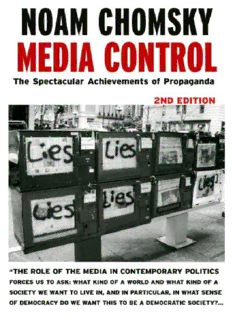
Media control: the spectacular achievements of propaganda, Second Edition PDF
Preview Media control: the spectacular achievements of propaganda, Second Edition
MEDIA CONTROL Media Control The Spectacular Achievements of Propaganda SECOND EDITION NORM CHOMSKY CONTENTS MEDIA CONTROL: THE SPECTACULAR ACHIEVEMENTS OF PROPAGANDA .................................... 9 Early History of Propaganda .......................... 11 Spectator Democracy ................................ 14 Public Relations .................................... 22 Engineering Opinion ................................. 30 Representation As Reality ........................... 35 Dissident Culture ................................... 38 Parade of Enemies .................................. 42 Selective Perception ................................ 46 The Gulf War ....................................... 53 THE JOURNALIST FROM MARS ........................... 69 About the Author ................................... 101 About Seven Stories Press .......................... 101 About Open Media Pamphlets and Books ............. 102 MEDIA CONTROL The Spectacular Achievements of Propaganda THE ROLE OF THE MEDIA in contemporary politics forces us to ask what kind of a world and what kind of a society we want to live in, and in particular in what sense of democracy do we want this to be a democratic society? Let me begin by counter-posing two different conceptions of democracy. One conception of democracy has it that a democratic society is one in which the public has the means to participate in some meaningful way in the management of their own affairs and the means of information are open and free. If you look up democracy in the dictionary you'll get a definition something like that. An alternative conception of democracy is that the public must be barred from managing of their own affairs and the means of information must be kept narrowly and rigidly controlled. That may sound like an odd conception of democracy, but it's important to understand that it is the prevailing conception. In fact, it has long been, not just in operation, but even in theory. There's a long history that goes back to the earliest modern democratic revolutions in seventeenth century England which largely expresses this point of view. I'm just going to keep to the modern period and say a few words about how that notion of democracy develops and why and how the problem of media and disinformation enters within that context. EARLY HISTORY OF PROPAGANDA Let's begin with the first modern government propaganda operation. That was under the Woodrow Wilson Administration. Woodrow Wilson was elected President in 1916 on the platform "Peace Without Victory." That was right in the middle of the World War I. The population was extremely pacifistic and saw no reason to become involved in a European war. The Wilson administration was actually committed to war and had to do something about it. They established a government propaganda commission, called the Creel Commission, which succeeded, within six months, in turning a pacifist population into a hysterical, war-mongering popu lation which wanted to destroy everything German, tear the Germans limb from limb, go to war and save the world. That was a major achievement, and it led to a further achievement. Right at that time and after the war the same techniques were used to whip up a hysterical Red Scare, as it was called, which succeeded pretty much in destroying unions and eliminating such dangerous problems as freedom of the press and freedom of political thought. There was very strong support from the media, from the business establishment, which in fact organized, pushed much of this work, and it was, in general, a great success. Among those who participated actively and enthusiastically in Wilson's war were the progressive intellectuals, people of the John Dewey circle, who took great pride, as you can see from their own writings at the time, in having shown that what they called the "more intelligent members of the community," namely, themselves, were able to drive a reluctant population into a war by terrifying them and eliciting jingoist fanaticism. The means that were used were extensive. For example, there was a good deal of fabrication of atrocities by the Huns, Belgian babies with their arms torn off, all sorts of awful things that you still read in history books. Much of it was invented by the British propaganda ministry, whose own commitment at the time, as they put it in their secret deliberations, was "to direct the thought of most of the world." But more crucially they wanted to control the thought of the more intelligent members of the community in the United States, who would then disseminate the propaganda that they were concocting and convert the pacifistic country to wartime hysteria. That worked. It worked very well. And it taught a lesson: State propaganda, when supported by the educated classes and when no deviation is permitted from it, can have a big effect. It was a lesson learned by Hitler and many others, and it has been pursued to this day.
Description: